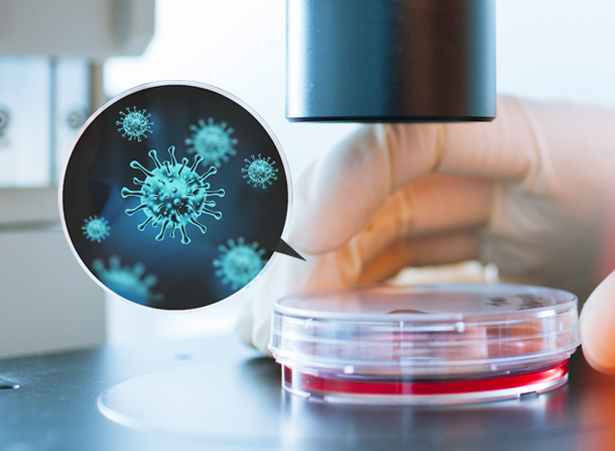Oncology
Our tests provide valuable insights on clinically relevant alterations in DNA that drive cancer growth, helping to transform targeted therapy, immunotherapy and chemotherapy clinical trials into viable cancer treatment options.
More Treatment Options with Better Precision For Each Unique Cancer.
Each cancer is unique and each tumor can vary at the molecular level.
Our test is a next-generation sequencing (NGS)-based assay that detects genomic alterations relevant for the diagnosis and treatment of solid tumors according to clinical guidelines and medical literature. Our test includes Cancer Immunotherapy Biomarkers: Tumor Mutational Burden (TMB), Blood Tumor Mutational Burden (bTMB), Microsatellite Instability (MSI) and four forms of genomic alterations: single nucleotide variant (SNV), Insertion/Deletion (InDel), copy number variation (CNV) or Fusion. Our reports present the mutations detected in the submitted patient sample and information on approved therapies, clinical trials and other scientific findings.

What we offer?
| Services | NovoPM™ 2.0
DETAILS |
NovoFocus™ NSCLC 2.0 DETAILS |
NovoFocus™ CR DETAILS |
NovoFocus™ CRC 2.0 DETAILS |
NovoFocus™ PARPi CDx 1.0 DETAILS |
|---|---|---|---|---|---|
| Service Features/ Analysis Results | For All Solid Tumors | For Non-Small Cell Lung Cancer | For Multiple Cancers | For Colorectal Cancer | For Breast Cancer Ovarian Cancer and other Solid Tumors |
| Evaluates Targeted, Immune and Chemo Therapy | Evaluates Targeted and Chemo Therapy | ||||
| Predicts Immunotherapy Responses | Evaluates Targeted and Chemo Therapy | Evaluates Risk Management Measures | Predicts Immunotherapy Responses | Evaluates Targeted and Risk Management Measures | |
| Screens 484 Cancer-related Genes | Screens 47 NSCLC-related Genes | Screens 106 hereditary genes | Screens 50 CRC-related Genes | Screens BRCA1/2 and HRD-related Genes |
Step 1:
Send us Patient's Sample
Step 2:
Sample Preparation
Step 3:
Library preparation & Sequencing
Step 4:
Bioinformatics Analysis
Step 5:
Actionable report
Step 1:
Send us Patient's Sample
Step 2:
Sample Preparation
Step 3:
Library preparation & Sequencing
Step 4:
Bioinformatics Analysis
Step 5:
Actionable report
Frequently asked questions about our diagnostic process
1. What is precision medicine?
Precision Medicine is an emerging approach to disease prevention and treatment that takes into account the differences of genetic, environmental, and lifestyle between individuals.
2. How can cancer patients benefit from precision medicine treatment?
Precision Medicine is currently the most novel way to treat cancer. The comprehensive genomic profiling (CGP) test can help patients find the mutated genes, and then give the interpretation of the alterations as well as corresponding therapy instructions. Ideally, upon treatment of the therapies suggested, patient’s condition can be most effectively controlled in the shortest time and unnecessary side effects can be avoided, since the medical treatment is specific to the patient himself that considers his genetic mutations.
3. Do I need a cancer genetic test? Which genetic test is right for me?
Genetic testing can give you and your doctor more information about cancer therapy. This information can help your doctor determine the most appropriate treatment strategy. Since the treatment of cancer could be very complicated, which depends on the type of cancer, the physical condition of the patient, as well as the history of medications, please fully discuss with your physician about the suitable testing product and timing, so as to improve the testing effectiveness.
4. What is the difference between Novogene's clinical oncology testing service and hospital pathology testing programs?
Novogene's clinical oncology testing performs multi-gene testing for cancer patients. The testing service is different from the single-gene testing in hospitals, as it can provide complete genetic alteration analysis on genes included in the testing panel.
5. What information is provided in the report?
We provide genetic mutations with related interpretation, medication information, clinical trials information and related references.
Results & Reporting

Information about identified genomic alterations of all types and interpretation of results.
Early detection provides the opportunity to maximize health outcomes for your high-risk patient groups with patient-tailored screening programs, preventive measeures and proactive treatment.
Information about identified genomic alterations of all types and interpretation of results.
Early detection provides the opportunity to maximize health outcomes for your high-risk patient groups with patient-tailored screening programs, preventive measeures and proactive treatment.
More resources


